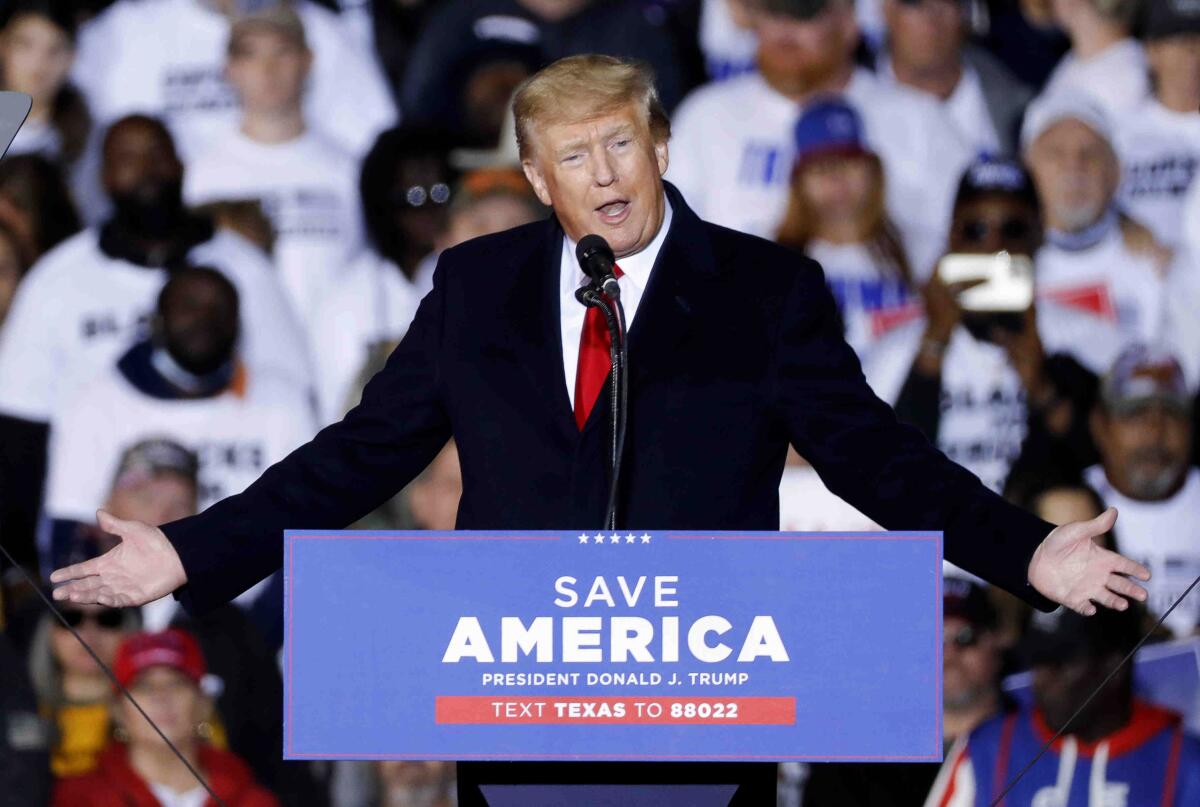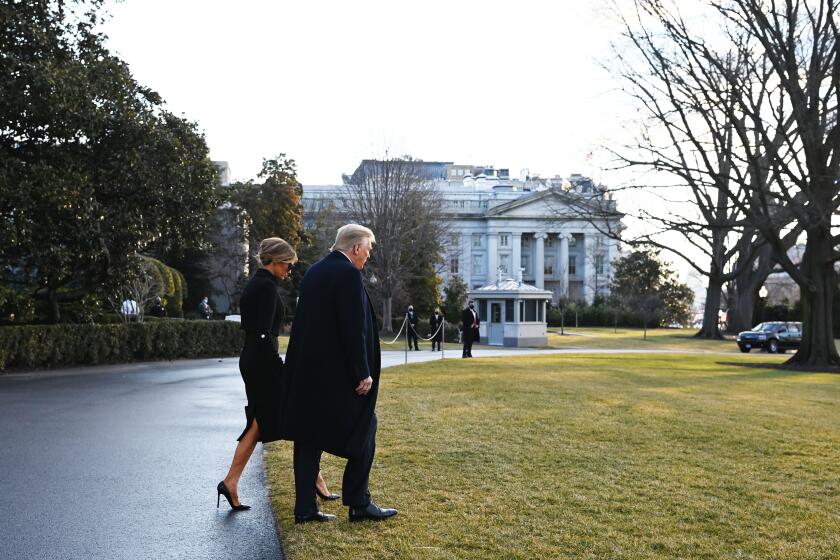Editorial: Trump’s vow to pardon Jan. 6 insurrectionists is itself an attack on the rule of law

- Share via
At the core of ex-President Trump’s self-focused ideology is the notion that allegiance to him transcends respect for the institutions and norms that have made the United States history’s preeminent exemplar of democracy.
So it’s not surprising that he now says that if he becomes president again, he’d consider pardoning those involved in the Jan. 6, 2021, attack on the Capitol in which many rioters sought to overturn the presidential election results.
Trump’s statement at a Saturday rally in Texas, and the revelation that he considered pardoning the rioters before he left office, are troubling even if he doesn’t return to office and never can grant the clemency that he’s floating.
The mere prospect of pardons interferes with the hundreds of assault, conspiracy and sedition prosecutions and investigations currently under way, because it changes the calculation of the defendants, who may reconsider whether to plead guilty or proceed to trial if they believe they ultimately may be pardoned. It also could affect the prosecution, which may wonder whether proceeding is worth the time and cost if the real contest between right and wrong, guilt and innocence, is to be taken away from the courts and the criminal justice system and decided instead by the winner of the next election.
Trump again grants clemency to the deserving and the undeserving alike.
It also could affect the willingness of accused rioters and insurrectionists to testify before the House Jan. 6 select committee. Why respond to a subpoena and bring more light to what happened on that day if any pending or potential criminal charges might be wiped away by the stroke of a pen, in the event Trump does again become president?
Elections, of course, have the central role in the American system of democracy, so it is especially ironic that Trump and those whom he would pardon tried so hard to subvert the results of the last one and now hang their hopes on the next. In any real democracy, election results must be respected regardless of the outcome. It is not enough to believe in elections only if they are rigged on your behalf.
But the courtroom too has an irreplaceable role in any true democracy. For all its many flaws, the justice system seeks to ferret out truth and sanction criminal behavior, one case at a time, regardless of who holds political power or how popular or despised the defendant may be.
By dangling the prospect of pardons, Trump makes the justice system just one more subordinate branch to be won or lost by partisan factions. Poorly exercised pardon power makes a mockery of the Constitution’s separation of powers and its carefully calibrated checks and balances.
Donald Trump has abused the office like no president before him. It’s time for serious reform to preserve our democracy.
It is true that the presidential authority to “grant reprieves and pardons for offenses against the United States” is itself embedded in the Constitution as one such check — a sort of relief valve for a person convicted of a crime when the interests of justice demand clemency, lenience or a clean slate.
Yet Trump’s blatant misuse of the pardon when he was in office spotlighted a need for defining those powers more narrowly. He used the power to benefit cronies, political allies and family — people like his advisor Stephen K. Bannon, campaign Chairman Paul Manafort, and a host of former elected officials who were convicted of corruption charges.
Legislation such as the Protecting Our Democracy Act would require the president and the Justice Department to provide Congress information regarding each prosecution for which the president seeks to grant a pardon, and each pardon itself. That would be an important check because it would put pressure on the president to justify his decisions and face scrutiny for them in Congress. Another check would be to apply the federal bribery statute to prevent pardons in exchange for money or political considerations.
The only airtight solution is a constitutional amendment curbing the pardon power. One has been introduced, but of course passage would take years if not decades.
Trump said he would consider pardons for the Jan. 6 rioters not because he would rather they had succeeded, but because they are being “treated unfairly.” In his view, unfairness includes the fact that the District of Columbia’s jails are miserable places to be. Yet Trump doesn’t seem too eager to pardon other people held in the same unpleasant lockup.
It’s hard to imagine a cohort of people more suitable for pretrial incarceration than defendants charged with attempting to overthrow the U.S. government by violence.
It’s dispiriting to realize that there is a need for curbs on presidential pardons, because who would have thought a president would misuse power in such a way? But in the Trump era, the assumption that every president will act honorably is out the window, and the need to fine-tune the government’s checks and balances is paramount.
More to Read
A cure for the common opinion
Get thought-provoking perspectives with our weekly newsletter.
You may occasionally receive promotional content from the Los Angeles Times.











